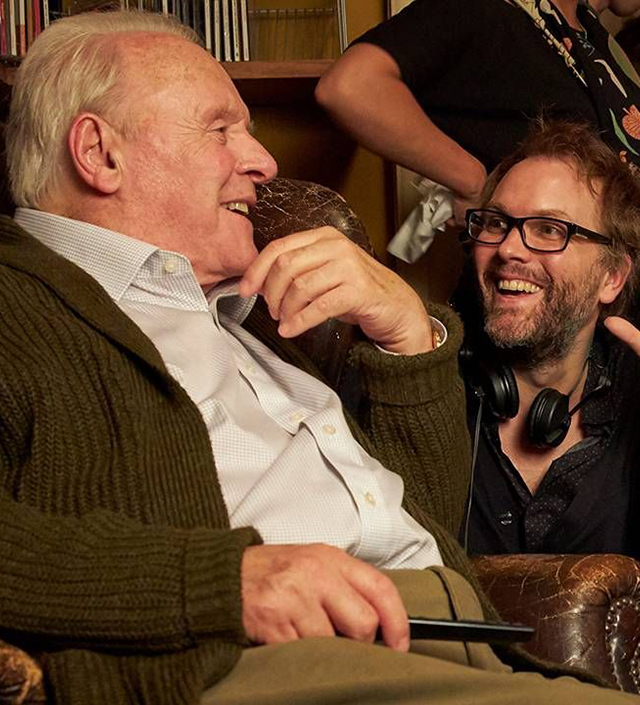Anthony Hopkins plays Anthony, a strong and stubborn man in his 80s struggling with dementia. Olivia Colman, as his adult daughter Anne, is his primary caregiver.
At the beginning of the film, “The Father,” for which Anthony Hopkins won the best-actor Oscar April 25, the star character is living in his own apartment with an aide whom Anne has hired to assist him. Quickly, it becomes apparent that Anthony’s dementia is progressing and that Anne will have to make some difficult decisions about her father’s care.
Originally, “The Father” was written as a play by Florian Zeller, director of the film. The play premiered in Paris in 2012 and on Broadway in 2016 with Frank Langella in the lead role.
Zeller, 41, who lives in Paris, wrote the play based on his experience with his grandmother. Zeller says, “She raised me and when I was fifteen, she began showing signs of dementia. It was a painful process and I remember feeling impotent. I realized that love was not enough and there was nothing I could do to help her.”
Zeller’s goal in writing the play was not to tell his story, but rather to write about a situation that many people would relate to.
“That is the whole idea of art,” he says. “To take something personal to you but share it and find out that you are a part of something bigger.”
The Immersive Experience of the Film
Prior to my interview with Zeller (who also co-wrote the film’s screenplay with Christopher Hampton), I watched an advanced copy of the film. After 20 minutes, I was felt confused and a little lost (so much so that I rewound two scenes to see if I had misheard some dialogue).
It turns out that is precisely the reaction Zeller wants the audience to have.
“I wanted to create an immersive experience where they are a part of the narrative. Instead of watching the story unfold, the viewer is an active participant, experiencing [along with Anthony] what it is like to lose your bearings,” he says.
The fact that the main character’s name is Anthony is not a coincidence: Zeller wrote the role with Anthony Hopkins in mind.
Anthony [Hopkins] worried that since his name is also Anthony, it would be confusing. But I thought it worked perfectly,” says Zeller. “I liked the idea that the audience already knew Anthony [Hopkins] from his body of work. It made it more personal that this strong, charismatic man they have known for years was slipping away right before their eyes.”
The Caretaker’s Difficult Role
As Anthony grows more confused and disoriented, his moods change quickly, a prevalent symptom of people with dementia.
“One of the most painful parts of the disease is how at any moment the person can go from loving and kind to incredibly cruel, to sad and almost childlike,” says Zeller. “We watch Anne patiently trying to remember that it is the disease speaking and not her father, but it is still draining.”
In addition to featuring Anthony’s perspective, the film also illuminates the difficult role of being a caregiver to someone with dementia. Once the child in the relationship, Anne has become the parent to her father. Her exhaustion is palpable. The audience is privy to Anne’s inner conflict as she struggles to balance his needs with her own.
“In these situations, there are a lot of questions and no one right answer. Anne wants to do what is best for her father, but she also wants to have a life and she is allowed to want a life,” Zeller explains. “She feels guilty, but she is valuable, too. Olivia [Colman] is so lovable in real life and she brings this lovability to the character of Anne. The audience can’t help but empathize with her.”
Typically, when a stage piece moves to film, the writer adds some outdoor scenes to open up the production. Zeller deliberately did not do this because he wanted the audience to have a closed-in feeling.
“Dementia makes a person’s world smaller, so keeping the action all in one place worked well,” Zeller says. “The apartment is deliberately shown as a labyrinth, a puzzle built with contradictions. You recognize the space, but little things keep changing and disappearing for the audience, as well as for Anthony.”
Keeping the action in one basic location also works for Anne’s narrative. Zeller says, “Caretaking makes a person’s world feel closed off and lonely, like there is no outside world.”
Empathy for Others Is Important
Feeling isolated and being stuck inside alone is something most people can relate to right now. The pandemic has forced people to be separated from friends and loved ones to minimize the spread of the virus. Zeller believes that makes the message of the movie even more powerful than when the play premiered years ago.
He explains: “People need to feel connected to each other, even when they are apart. Especially now, empathy for one another is so important.”
Zeller recalls that after performances of “The Father,” theatergoers would come over and thank him for writing the play.
“They said they could see themselves in the story and that there was something powerful about knowing that we were brothers and sisters in pain,” he says.
Zeller hopes audiences will have a similar response to the film. “Our fragility connects us. Even though the subject matter is sad, I do hope the film helps people to feel better understood and less alone,” he says.
©Next Avenue. Randi Mazzella is a freelance writer specializing in a wide range of topics from parenting to pop culture to life after 50. She is a mother of three and lives in New Jersey with her husband and teenage son. Read more of her work on randimazzella.com. This article was first published on nextavenue.org.







